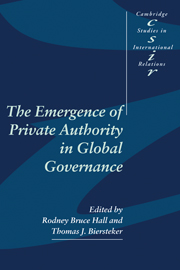Book contents
- Frontmatter
- Contents
- List of figures
- List of tables
- List of contributors
- Preface and acknowledgements
- Part I Introduction: theorizing private authority
- 1 The emergence of private authority in the international system
- 2 Private international regimes and interfirm cooperation
- Part II Market authority: globalization and “globaloney”
- Part III Moral authority: global civil society and transnational religious movements
- Part IV Illicit authority: mafias and mercenaries
- Part V Conclusions and directions
- Bibliography
- Index
- CAMBRIDGE STUDIES IN INTERNATIONAL RELATIONS
1 - The emergence of private authority in the international system
Published online by Cambridge University Press: 22 September 2009
- Frontmatter
- Contents
- List of figures
- List of tables
- List of contributors
- Preface and acknowledgements
- Part I Introduction: theorizing private authority
- 1 The emergence of private authority in the international system
- 2 Private international regimes and interfirm cooperation
- Part II Market authority: globalization and “globaloney”
- Part III Moral authority: global civil society and transnational religious movements
- Part IV Illicit authority: mafias and mercenaries
- Part V Conclusions and directions
- Bibliography
- Index
- CAMBRIDGE STUDIES IN INTERNATIONAL RELATIONS
Summary
Traditional notions about authority in the international system derive from Weberian conceptions of the state and of the domain of international politics. There is a presumption within much of international relations theory, consistent with Weber, that the domain of the domestic is fundamentally different from the domain of the international. For Weber, the essence of the state is its ability to claim “the monopoly of the legitimate use of physical force within a given territory.” Because of their claims to legitimate authority, most states “can rely on the habitual obedience of their citizens by establishing legal codes in which the threat of physical coercion is only implicit.”
According to most traditional accounts, however, this ability to rely upon legitimate authority for habitual obedience is largely absent in the international system. International politics take place in a realm where anarchy allegedly reigns. States act in their own interest and sometimes employ force to achieve their objectives. The absence of a global state has led many observers to deny the very existence of authority, defined as legitimized power, operating within the international arena. States are both the source, and the exclusive location, of legitimate, public authority. This applies to the operations of states both in the realm of domestic affairs, and in the international arena. Until recently, therefore, most explanations of international behavior have concentrated on the coercion employed by states or on the self-interested motivations of individual states, to the virtual exclusion of the recognition by states of the legitimacy and authority of rules and norms operating within the international system.
- Type
- Chapter
- Information
- Publisher: Cambridge University PressPrint publication year: 2002
- 83
- Cited by

